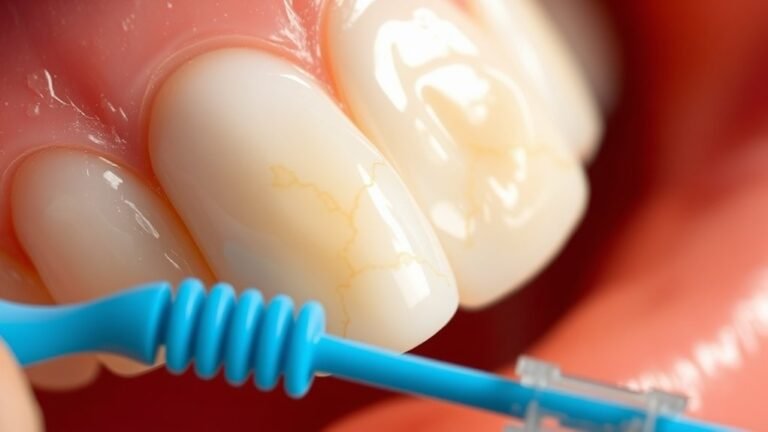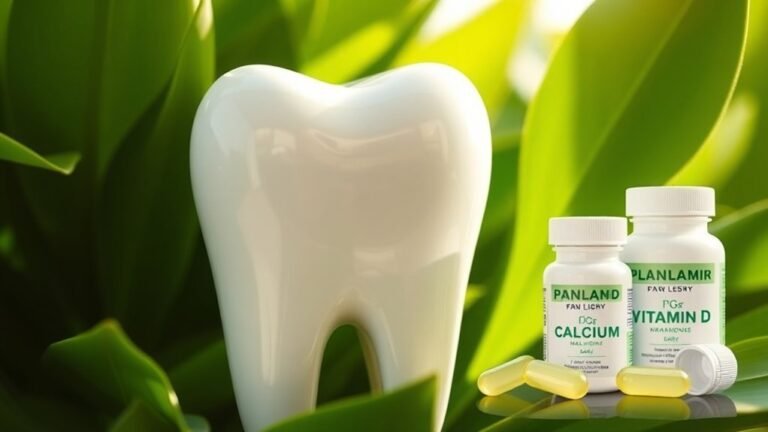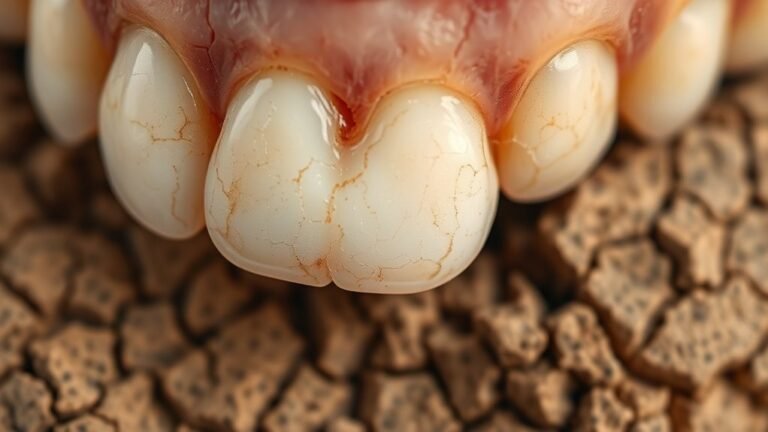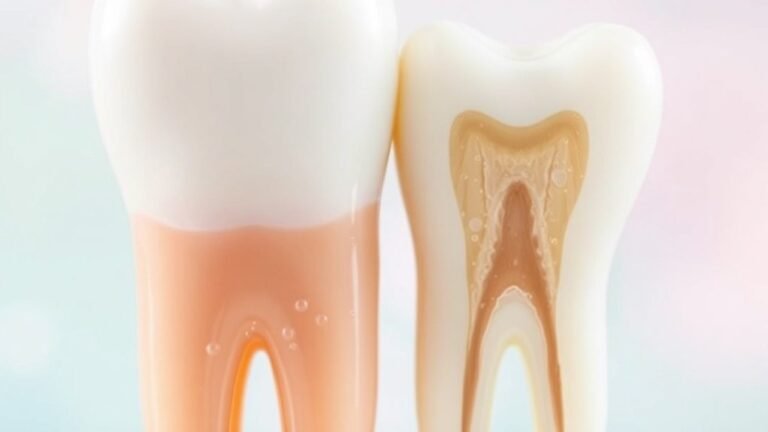How Does Saliva Protect Against Enamel Weakening and Sensitivity
Saliva protects your enamel by neutralizing harmful acids from foods and drinks, which reduces acidity in your mouth. Its minerals, like calcium and phosphate, help remineralize enamel, making it stronger. Saliva also acts as a natural barrier against harmful bacteria and plaque, preventing decay. When you have adequate saliva flow, it becomes easier to maintain balanced pH levels, reducing sensitivity and erosion risks. Discover more about how to enhance this essential oral health protector.
Key Takeaways
- Saliva neutralizes acids from food and beverages, raising pH levels and reducing enamel erosion risk.
- It contains calcium and phosphate, which are essential for the remineralization of weakened enamel.
- Antimicrobial proteins in saliva inhibit harmful bacteria, reducing plaque formation that can lead to enamel decay.
- Increased saliva flow enhances its buffering capacity, effectively diluting acids and minimizing enamel exposure to harmful substances.
- Adequate hydration supports saliva production, protecting against tooth sensitivity and promoting a balanced oral environment.
The Composition of Saliva and Its Role in Oral Health
Saliva, often overlooked, plays an important role in maintaining oral health through its complex composition. Comprised mainly of water, it contains electrolytes, enzymes, proteins, and antimicrobial agents that collectively contribute to saliva protection. The electrolytes, such as calcium and phosphate, help remineralize enamel, counteracting demineralization caused by acids. Antimicrobial proteins, including lysozyme and lactoferrin, inhibit harmful bacteria, reducing the risk of cavities and gum disease. Additionally, enzymes like amylase begin the digestion of carbohydrates, preventing food particles from lingering and causing plaque buildup. This intricate balance guarantees your mouth remains a healthy ecosystem, safeguarding against decay and maintaining overall oral hygiene. Understanding saliva’s composition highlights its crucial role in protecting your teeth and gums.
How Saliva Neutralizes Acids in the Mouth
When acidic foods or beverages enter your mouth, your saliva quickly springs into action to neutralize these harmful substances. This process primarily involves saliva flow, which dilutes acids and raises the pH level in your mouth, creating a more neutral environment. Saliva contains bicarbonate ions, which effectively counteract acidity. Research shows that an increase in saliva flow enhances this buffering capacity, reducing the time your enamel is exposed to harmful acids. Additionally, the continuous secretion of saliva helps wash away food particles and acids, minimizing their effects on your teeth. By maintaining a balanced oral environment, saliva plays a vital role in protecting your enamel from weakening and sensitivity, ultimately supporting your overall dental health.
The Process of Remineralization: A Saliva-Dependent Mechanism
When you consider remineralization, it’s essential to recognize the role of minerals like calcium and phosphate found in saliva. These minerals not only help restore enamel but also require a balanced pH to effectively combat demineralization. Understanding this saliva-dependent mechanism can enhance your approach to oral health and enamel protection.
Role of Minerals
Minerals play an essential role in the process of remineralization, acting as the building blocks that help restore enamel after demineralization. Saliva contains important minerals like calcium and phosphate, which are key for mineral replacement in the enamel structure. When you consume acidic foods, these minerals can leach out, weakening the enamel. However, saliva’s buffering capacity allows it to neutralize acids and facilitate the absorption of these minerals back into the enamel. Research indicates that increased saliva flow enhances the concentration of calcium and phosphate, promoting effective remineralization. By regularly stimulating saliva production, you’re supporting this natural repair process, helping to maintain your enamel’s strength and reduce sensitivity over time.
Ph Balance Importance
Maintaining a balanced pH in your mouth is essential for effective remineralization, as it directly influences the enamel’s ability to recover from demineralization. When the pH drops below 5.5, your enamel becomes more susceptible to decay, and the oral microbiome can shift towards harmful bacteria that produce acids. Saliva plays a critical role in neutralizing these acids, helping to restore a healthier pH. This process enhances the availability of calcium and phosphate ions, which are important for remineralizing enamel. Research shows that a balanced pH supports beneficial bacteria while inhibiting pathogenic strains, promoting a healthier oral environment. As a result, maintaining pH balance not only aids in enamel repair but also fosters a favorable oral microbiome, essential for long-term dental health.
Saliva as a Barrier Against Bacteria and Plaque Formation
Saliva plays an essential role in protecting your oral health by acting as a natural barrier against harmful bacteria and plaque formation. It contains antimicrobial properties, such as lysozyme and immunoglobulin A, which help neutralize pathogens that contribute to dental plaque. When you eat, saliva washes away food particles and reduces the acidity in your mouth, further inhibiting bacterial growth. This process not only prevents plaque accumulation but also helps maintain a balanced oral microbiome. Regular saliva flow is vital; it dilutes and clears away harmful substances that can lead to tooth decay and gum disease. By promoting a healthy environment, saliva effectively minimizes the risk of dental plaque formation, safeguarding your enamel and overall oral health.
The Importance of Saliva Flow for Enamel Protection
Saliva plays a critical role in protecting your enamel through its unique composition, which includes minerals like calcium and phosphate essential for remineralization. When saliva flows adequately, it effectively neutralizes harmful acids produced by bacteria, reducing the risk of enamel erosion. This continuous flow not only shields your teeth but also enhances the natural repairing processes necessary for maintaining strong enamel.
Saliva Composition Benefits
The intricate composition of saliva plays an essential role in safeguarding enamel, the protective outer layer of your teeth. Saliva production is important, as it contains various components that directly contribute to enamel health.
- Minerals like calcium and phosphate strengthen enamel.
- Proteins in saliva help form a protective barrier against bacteria.
- Buffers neutralize acids, maintaining a balanced pH in your mouth.
- Antimicrobial agents prevent harmful bacteria from causing decay.
When saliva flow is optimal, these elements work together to keep your enamel resilient and minimize sensitivity. Insufficient saliva production can lead to a higher risk of enamel erosion, making it critical to maintain good hydration and oral health practices for effective enamel protection.
Neutralizing Acids Effectively
When you consume acidic foods or beverages, your mouth’s pH levels drop, creating an environment that can lead to enamel erosion if not promptly addressed. Saliva plays a critical role in acid neutralization, as its bicarbonate, phosphate, and protein content helps restore a balanced pH. The flow of saliva increases after eating, promoting this neutralization process and minimizing potential damage to your enamel. Studies show that adequate saliva flow can effectively counteract the harmful effects of acid exposure, reducing sensitivity and preserving enamel integrity. Additionally, saliva’s ability to wash away food particles and acids further supports this protective mechanism. Ensuring ideal saliva production is essential for maintaining your oral health and preventing enamel erosion.
Enhancing Remineralization Process
While you might not think about it often, maintaining adequate saliva flow is paramount for enhancing the remineralization process of your enamel. Saliva not only neutralizes acids but also supplies essential minerals that aid in enamel remineralization. When saliva flow is optimal, your teeth can recover from the effects of demineralization much more effectively.
- Provides calcium and phosphate, critical for enamel strength
- Helps maintain a neutral pH, preventing further acid damage
- Washes away food particles and bacteria, reducing plaque buildup
- Facilitates the transport of fluoride from dental products to enamel
The Impact of Dehydration on Saliva Production and Oral Health
Dehydration considerably reduces saliva production, which can lead to a cascade of oral health issues. When your body lacks adequate hydration, saliva becomes less abundant, impairing its protective functions. Saliva helps neutralize acids produced by bacteria, wash away food particles, and provide essential minerals to teeth. Reduced saliva production increases the risk of cavities, gum disease, and bad breath. A study published in the Journal of Dental Research highlights that individuals with chronic dehydration often experience heightened sensitivity and enamel erosion due to diminished saliva flow. Consequently, maintaining proper hydration is vital for ideal saliva production and overall oral health. By ensuring you drink enough water daily, you can support your oral health and protect your enamel effectively.
Dietary Factors That Influence Saliva Composition
Your diet plays an essential role in determining the composition of your saliva, particularly through the intake of nutrient-rich foods. Consuming a variety of vitamins and minerals can enhance saliva’s protective functions, while adequate hydration is important for maintaining its flow and consistency. Understanding these dietary factors enables you to make informed choices that support your oral health.
Nutrient-Rich Foods
Nutrient-rich foods play an essential role in shaping the composition of saliva, which directly impacts oral health and enamel protection. A balanced diet rich in vitamins and minerals can enhance saliva’s ability to neutralize acids and remineralize enamel, ultimately supporting your oral hygiene.
- Dairy products: Provide calcium and phosphate, vital for enamel strength.
- Leafy greens: High in vitamins A and C, promoting healthy gums and saliva production.
- Nuts and seeds: Rich in healthy fats and vitamins, they help maintain oral moisture.
- Fruits: Citrus fruits stimulate saliva flow, while apples help clean teeth naturally.
Incorporating these foods into your diet guarantees a supportive environment for saliva, enhancing its protective functions against enamel weakening and sensitivity.
Hydration Levels
Hydration levels greatly influence saliva composition and, consequently, oral health. When you’re well-hydrated, your body produces saliva rich in essential minerals like calcium and phosphate, which are vital for preventing enamel erosion. Insufficient hydration can lead to a decrease in saliva production, resulting in a dry mouth. This condition not only hinders your oral care routine but also increases the risk of cavities and sensitivity. Studies show that ideal hydration helps maintain a balanced pH in your mouth, combating acid attacks from food and bacteria. By ensuring you drink enough water throughout the day, you support saliva’s natural protective functions, promoting a healthier oral environment and reducing the likelihood of enamel weakening and sensitivity.
Saliva and Its Role in Preventing Tooth Sensitivity
Although many people may not realize it, saliva plays an essential role in preventing tooth sensitivity. This natural fluid not only keeps your mouth moist but also contributes considerably to your dental health.
- Neutralizes acids: Saliva helps balance the pH in your mouth, reducing acid damage.
- Mineral replenishment: It delivers essential minerals like calcium and phosphate, crucial for enamel repair.
- Antimicrobial properties: Saliva contains enzymes and antibodies that combat harmful bacteria, lowering the risk of decay.
- Lubrication: It protects your teeth and gums from irritation and wear.
The Connection Between Saliva and Overall Health
Saliva isn’t just vital for dental health; it also plays a significant role in your overall well-being. This clear fluid helps maintain a balanced oral environment, which can affect systemic health. For instance, saliva contains antimicrobial agents that combat harmful bacteria, reducing the risk of infections and inflammation. A healthy saliva flow can prevent dry mouth, which is linked to conditions like cavities and gum disease, ultimately impacting your dental health. Furthermore, saliva aids digestion by breaking down food, contributing to nutrient absorption. Studies suggest that adequate saliva production correlates with lower risks of chronic diseases, including diabetes and cardiovascular issues. Consequently, maintaining ideal saliva levels is essential for both your dental health and overall health, reinforcing the interconnectedness of bodily systems.
Tips for Enhancing Saliva Production for Better Oral Care
To boost saliva production and enhance your oral care, consider incorporating certain habits into your daily routine. Saliva plays a critical role in neutralizing acids and protecting enamel, so increasing its flow can considerably benefit your dental health. Here are some effective strategies:
- Stay Hydrated: Drink plenty of water throughout the day to maintain moisture levels.
- Chew Sugar-Free Gum: This stimulates salivary glands, promoting saliva production.
- Eat Crunchy Fruits and Vegetables: Apples and carrots can help stimulate saliva flow.
- Limit Caffeine and Alcohol: These can lead to dry mouth, negatively affecting saliva production.
Frequently Asked Questions
Can Certain Medications Decrease Saliva Production and Affect Enamel Health?
Yes, certain medications, like antihistamines and antidepressants, can decrease saliva production. Reduced saliva leads to less natural protection for your enamel, increasing the risk of decay and sensitivity due to a drier oral environment.
How Does Genetics Influence Individual Saliva Composition and Function?
Genetics greatly influences your saliva’s composition and function, affecting enzyme levels, pH balance, and antimicrobial properties. Variations in genes can lead to differences in how effectively your saliva protects your oral health and enamel integrity.
What Are the Symptoms of Low Saliva Production?
If you have low saliva production, you might notice dry mouth, difficulty swallowing, bad breath, and increased tooth decay. These symptoms can impact your overall oral health and may require professional attention for management.
Can Mouthwash Impact Saliva’s Protective Role on Enamel?
Using mouthwash can impact saliva’s protective role on enamel like a raincoat blocking raindrops. Some mouthwashes contain alcohol or antibacterial agents that may reduce saliva production, potentially diminishing enamel’s natural defense against decay and sensitivity.
Are There Any Specific Foods That Boost Saliva Production?
Yes, foods like apples, carrots, and celery stimulate saliva production. Their crunchy texture encourages chewing, which activates salivary glands. Additionally, citrus fruits can increase saliva flow due to their acidity, promoting oral health.
Conclusion
In summary, saliva’s protective powers against enamel weakening and sensitivity are nothing short of miraculous. By neutralizing harmful acids, facilitating remineralization, and acting as a natural barrier against bacteria, saliva plays an essential role in maintaining oral health. With the right dietary choices and habits, you can enhance saliva production and bolster these protective mechanisms. Remember, a healthy mouth is a gateway to overall wellness, so prioritize your saliva for a radiant smile that withstands the test of time!






